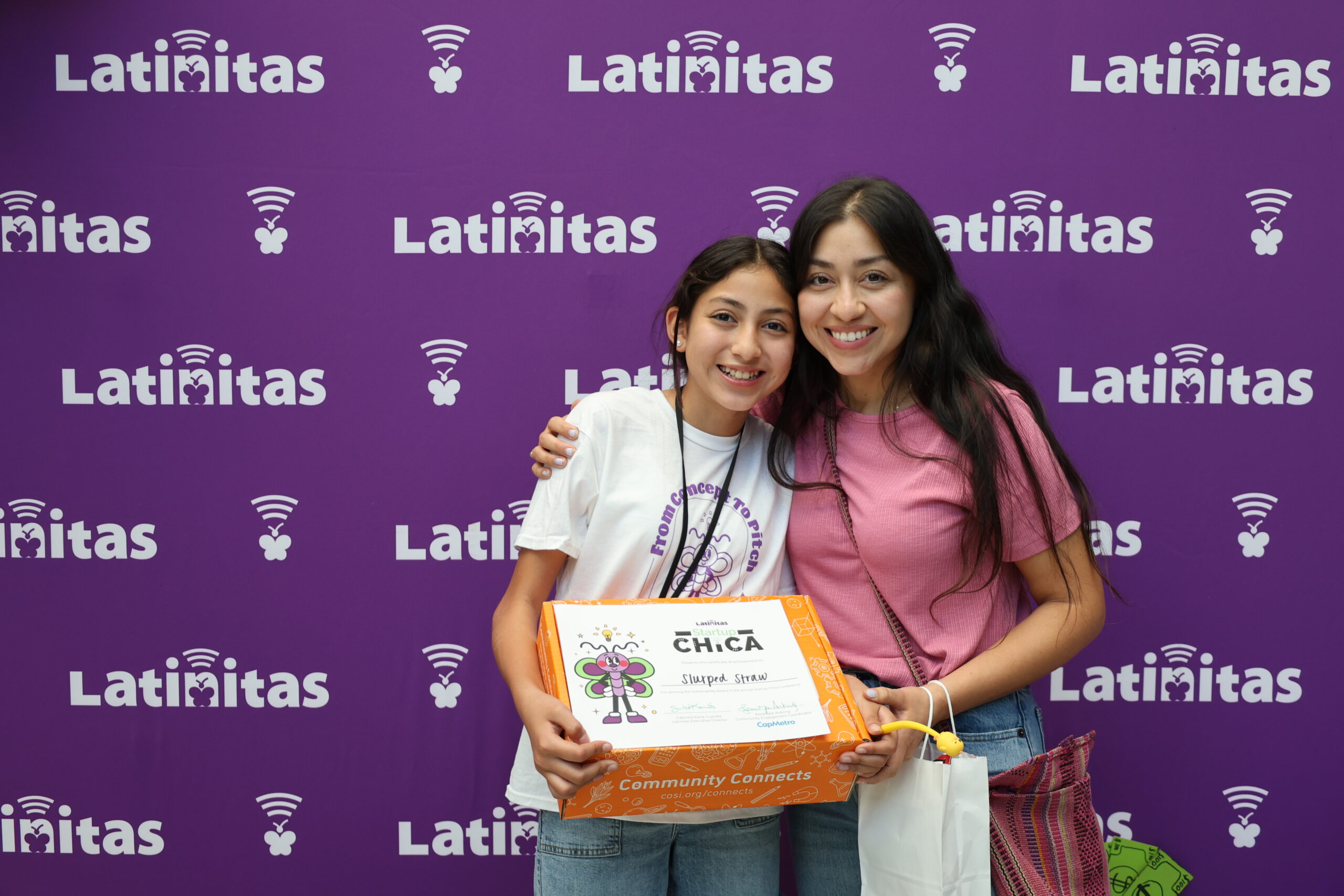On April 13, Latinitas hosted their annual one-day-only conference, Startup Chica, at the Austin Community College Highland campus. Throughout the day attendees, students between the ages of nine and fourteen, were inspired to create their own startup. Through various workshops, the students broke into teams. They brainstormed the idea, cost, and execution of their businesses, culminating in a Shark Tank-esque ending where the teams pitched in front of a panel of judges.
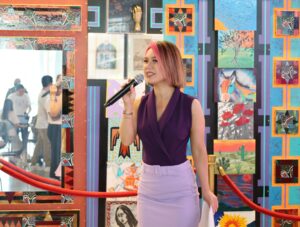
The event began at 10 AM, with Startup’s lovely Emcee, Barbara Campos, getting the students ready for what was sure to be an exciting day, “Today at Startup Chica you will learn what it takes to create a business from idea to pitch!” Campos cheered. After introductions, the students headed into the auditorium to meet their first Keynote speakers, Reyna and Maritza Vasquez, sisters and Co-founders of Veracruz All Natural. Throughout their conversation, the sisters shared with the students their life story. They were born in Mexico and moved to the US in 1999 to pursue the American dream. Reyna always wanted to be her own boss, and so in 2008, she decided to start the Veracruz business. While she wanted to sell food, as she’d worked in restaurants for years, the sisters started with what they could afford; snowcones and smoothies.
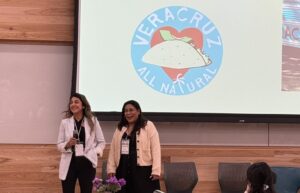
16 Years later, Veracruz All Natural has five locations and three food trucks and is now known for their delicious tacos. The business is booming, and after much hard work, the sisters now have over two hundred employees working for them. Following the Vasquez sisters came the next Speaker, Leslie Wade, Global OEM Customer Success Leader for Dell. Like the Vasquez Sisters, Wade was transparent about her at times unconventional road to success. At a young age, she chose to skip college and head directly into the workforce. Though it came with its challenges, she was able to become a manager, working full-time while raising a family. At a certain point, she found out Dell paid partially for secondary education and planned to utilize this to the best of her abilities.
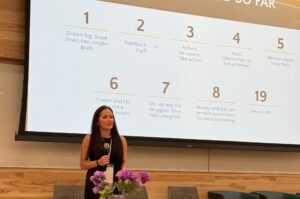
She took one class per semester, and though the road was long, she was finally able to graduate with her Bachelors eleven years later. Still working at Dell, she pursued her Master’s, got into nonprofit work, and aimed to always give back. Wade gave the girls some sage advice, “My biggest tip is just never giving up, right? Continue to go after your dreams and don’t stop, no matter what.” Both the Speakers’ stories were inspiring, important, and clearly impactful as the girls broke into teams and began brainstorming their company ideas.
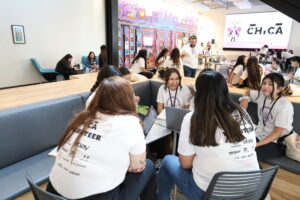
This first Workshop was for Objective and Strategy. It was all about coming up with a proper name, identity, and product for the brand. The students had to think about what problems existed in the world, and how their company aimed to solve them. It was exciting and empowering, as the students came together with one clear goal. After a good brainstorming session, they had worked up an appetite. Fortunately, it was time for a delicious lunch.
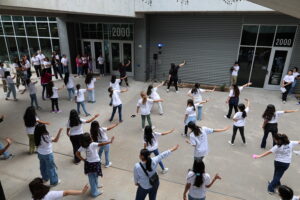
Once everyone had eaten, and was rightfully feeling a little tired, it was time to kick things into high gear with a dance exercise courtesy of Crystal De La Rosa, founder of ElectrikCity Dance. This was the perfect way to liven things up, and the students hurried outside to get things started. Once they were all lined up, Crystal began with the instructions, and step by step the students followed along. The music sampled various Latina artists, from Selena to JLo. It was a much-needed recess as the girls kept asking Crystal to go again and again, making sure they got all the moves down. Finally, they combined the steps and got to perform the whole thing to the music. Of course, they absolutely smashed it. What more could one expect from the Latinitas Chicas?
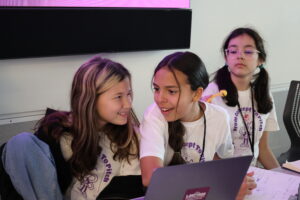
Now properly awake, the students thanked Crystal and her crew and headed back inside for their next Workshop. This one focused primarily on Marketing and Production. The how of it all. How would the company work, how would they market themselves, how would they get their product made? These were tough questions, but whenever the students hit a roadblock, they always had their trusted mentors to lean on. These were Volunteers and Team Leaders who worked with the students throughout the day, aiding them in their presentations and public speaking.
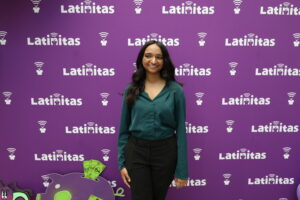
Once they’d solved how their marketing would work, they were back in the auditorium for advice on how to pitch from their last Speaker of the day, Sahana Raj. Raj is a nineteen-year-old UT student and founder of Energy Umbrella, an energy company aiming to give power to all by bringing their foldable solar pods to places where grid energy just isn’t possible. Sahana Raj is no stranger to a pitch, and gave the students her best tips for a memorable presentation, “The main thing is just to be confident in what you’re saying, and making sure that you practice before you do it…Just get up there, try your best, make sure you’re having a good time, that will be conveyed to the people watching.”
With Raj’s advice fresh on their minds, the students went off for their final Workshop. They took all the information they’d learned throughout the day and worked out how best to present it. Students took Raj’s advice to heart, as they stood in front of everyone, rehearsing their presentation. They were a bundle of nerves as they entered the auditorium for practice, and before we knew it, it was time for the pitches!
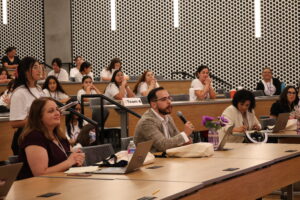
This time when the students walked into the auditorium, the first row was lined with our business experts, the judges panel, consisting of Carlos Balderas from Cap Metro, Steven Bugarin from Dell, Brittany Heckard from Waymo, Sineria Ordoñez from Comerica, Elizabeth Rodriguez from Verizon, Denise Guzman from Atlassian, and Melisa Sullivan from Ouro. Each team was given four minutes to present, with an extra two minutes to answer any questions the judges had. Following that, the judges would adjourn to make their final decision, with the winner being announced at the end of the day.
Team 1: Crafty
The students pitching their business, Crafty, began their presentation with a skit, “Oh man, your drawings are so amazing! And mine look weird.” One of the students despaired, “I mean, I’m not really good at other types of art either–how do you get yours to be so amazing?” To which her teammate responded, “Well, I use Crafty! With Crafty’s many videos and helpful tutorials, I managed to draw really well!” Crafty is an application that helps with art. It features tutorials, videos, and a platform to share your own art. The app has a free version with features like complimenting someone’s art if they try to delete it, empowering and encouraging the artist, different languages, and the ability to recycle art materials. With a payable upgrade, Crafty can also offer different brush textures and even aid users in selling their art. The team estimated their business would need $7,500 to get Crafty off the ground.
Team 2: Slurp It
Team 2 wanted to reinvent the way we see eco-friendly straws, by creating Slurp It, a straw that filters out dirty water and replaces it with flavorful drinkable water, “We created Slurp so we can drink water and won’t get sick, and we can have good flavors with it as well.” Slurp aimed to target to an audience of 16 and up as “We would probably have to have a parent’s approval to be able to have younger people buy it.” One teammate stated. One pack of Slurp straws starts at $22.99, with the team estimating it would take $10 to create make on straw. And as for Flavors? Slurp comes in Strawberry, Mango, and Wildberry.
Team 3: reVivaTech: Recycling and Reuse Center
The team started off strong with a clear goal, “Our mission statement is empowering communities through responsible electronic waste management and promoting sustainable purchases.” What does that boil down to? reVivaTech aims to create places to get rid of electronics correctly, so they won’t be hazards in our landfills. The team came prepared with a SWOT slide, filled with their Strengths, Weaknesses, Opportunities, and Threats, “Our strengths will be we’ll supporting a strong community, and we’re handling waste responsibly.” When it came to financials, the students estimated they would need $220,000 for retail store rent, utility bills, licenses and permits, and employees.
Team 4: Boba Boutique
Team Four started off with a logo and a slogan, “Sip and Thrift”. Their Boba Boutique wouldn’t just be a clothing and boba store, it would be a thrift store, “We are a small business that wants to help the Earth by reducing waste and reusing clothing products.” All the while, the business would sell delicious Boba to get them off the ground. Their target audience is people who love shopping and boba, specifically kids and young adults. When it comes to ordering some yummy boba, the prices vary, but start out with a small at $4.50, all the way up to $9 for a large, with an additional charge of $1.50 if you choose fusion boba.
Team 5: Serene Glow
Team 5 is aiming to shake things up in the skincare aisle with their series of clay and avocado-infused face masks, “We chose Serene Glow because we wanted to create a clean natural skincare product while reducing waste. We will be using the waste of the masks to create jewelry.” Targeting teenagers and preteens, Team 5 wants to start locally first. Catering to the Austin area before branching out. In the future, they do hope to expand to stores like Target, Sephora, and Ulta.
Team 6: PetFriender
Team 6 is trying to find solutions to overcrowded animal shelters with their pet compatibility app, PetFriender, “PetFriender helps people match with perfect pets of all kinds. This way, we help the overpopulation of shelters.” The drawing aspect of Team 6’s business is that, unlike the popular Pet Finder app, PetFriender seeks those specifically from shelters, and isn’t limited to traditional pets like dogs and cats, but goes beyond to snakes, bugs, and more unconventional pets like rabbits. To get PetFriender off the ground, Team 6 is asking for $6,000, and is planning to sell their app for $4.99. The team even planned out how much ads will cost, between $100 to $300.
With all the teams finished presenting, all that was left to do was wait for the judges to make their decision. And after a few minutes of waiting, the panel entered back in to give out the awards. The first was an honorable mention, which went to Team 5 with Serene Glow. Second up was the Sustainability Award, which went to the team whose eco-conscious design really stood out to the judges; Team 2 with Slurp. And finally, it was the moment we’d all been waiting for. The winner of this year’s Startup Chica, “And the first place winner is reVivaTech!” The team hurried down to accept their award, along with a hundred-dollar gift card. The day was an absolute success, and a huge hit with the students who walked out with a newfound sense of confidence and pride at all they had accomplished.
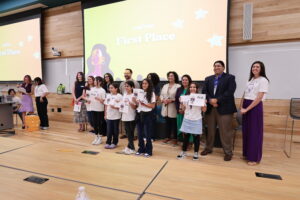
Once everything was said and done, Latinitas Executive Director Gabriela Kane Guardia came on stage to give a few parting thoughts, “Well Chicas, in my eyes all of you are winners today! You came and spent a Saturday investing in yourself. Growing, learning, exploring careers, learning the value of entrepreneurship, learning what it takes to build a business–and who knows! Maybe someday you will build a business that will give back to the next generation.”
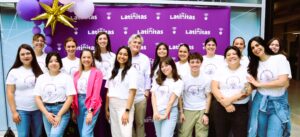
Startup Chica could not have been possible without the help of our incredible sponsors: Honda, ebay, Verizon, Zenbusiness, Waymo, Dell, Metro, Atlassian, Comerica, Ouro, Austin Telco.







